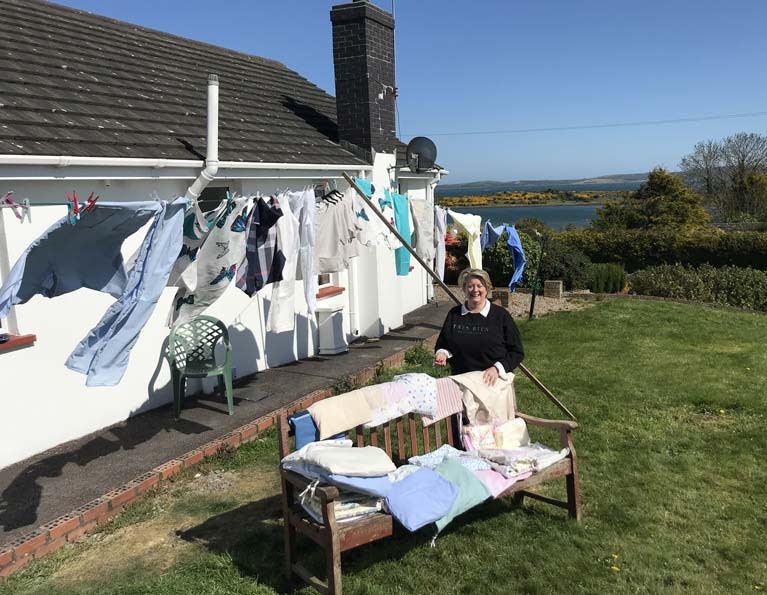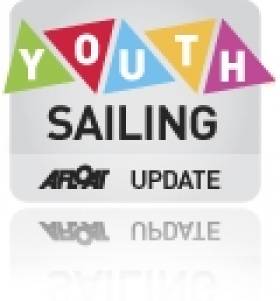Displaying items by tag: Quoile YC
Around the shores of Strangford Lough, two long-time friends, Thelma and Louise, set up the North Down & Ards Scrubs for NHS group. The group was set up to help support NHS workers such as Thelma’s son who is a key worker within the NHS.
The group, which was set up only three weeks ago and now has over 30 teams (averaging 10 members per team) including stitchers, cutters, drivers and a few independent sewers, has made over 500 scrub sets to date. A huge achievement in such a short period.
They have sourced, cut and sewn through 600m of fabric, countless numbers of bed linen and sets and have just ordered a further 600m to send out to the many volunteers involved.
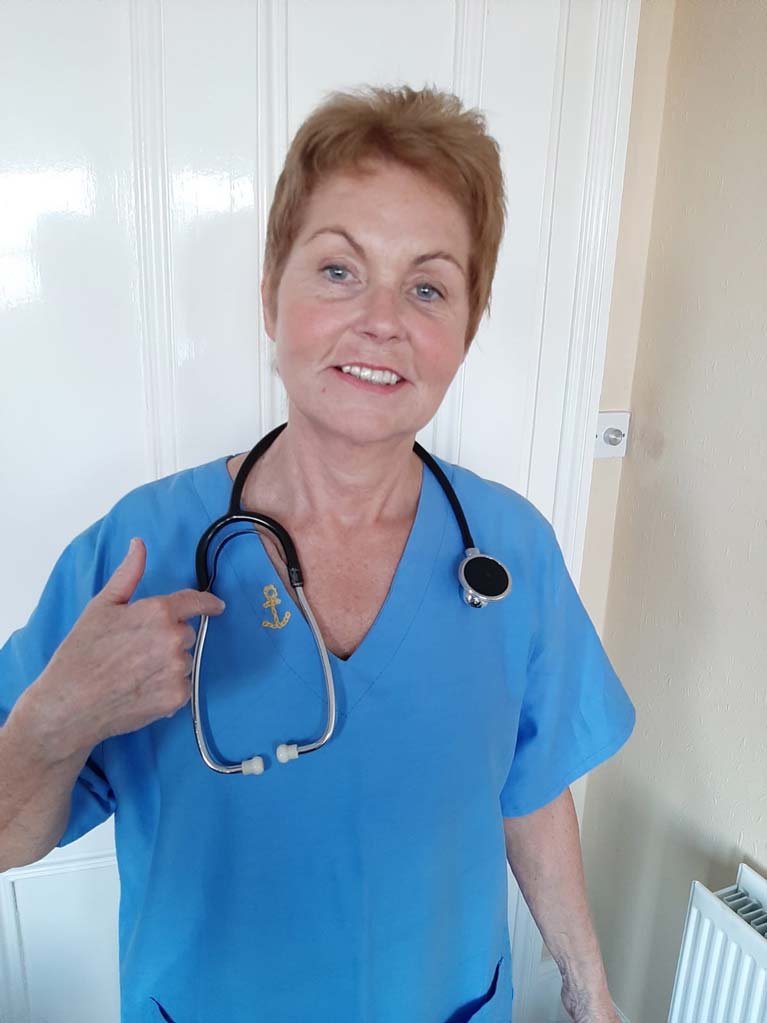 Joanne McGown trying on the scrubs made by the volunteers from Quoile Yacht Club and Killyleagh Yacht Club
Joanne McGown trying on the scrubs made by the volunteers from Quoile Yacht Club and Killyleagh Yacht Club
The volunteers include a team made up of club members from around Strangford Lough including Quoile YC and Killyleagh YC. The team led by Liz Baker, RYANI Development Committee member and Quoile Yacht club member, is working alongside 12 others from Quoile and Killyleagh. Other club members include – Jill Heron; Julie Chambers; Bridie McKeating; Paddy Mullan; Bridie Warren; Heather Crawford; Sheenagh Crawford; Liz McCormick; Dawn Crosby; Helen Bready; Allison Crichton and Viv White – even getting their husbands involved, who are gaining new skills by getting roped into trace and cut patterns for the scrubs.
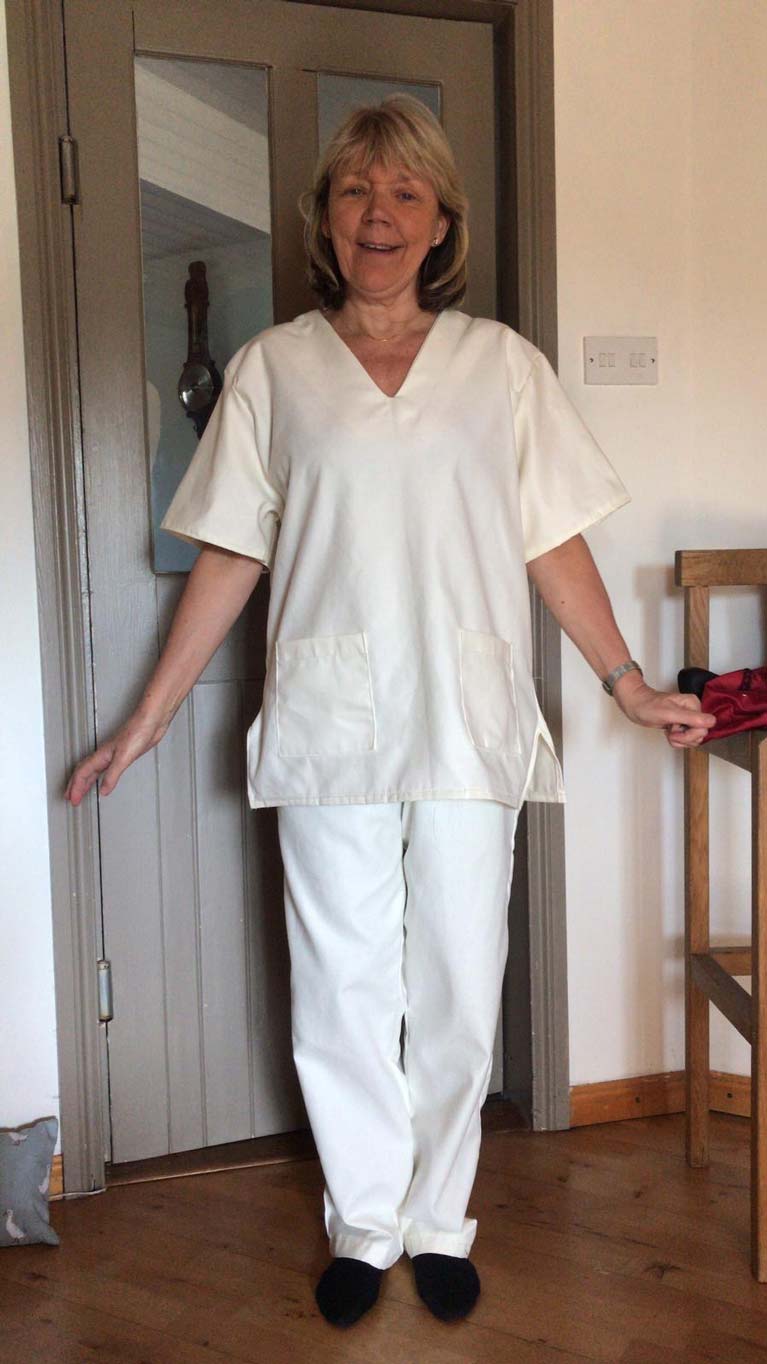 Julie Chambers trying on the scrubs
Julie Chambers trying on the scrubs
Liz Baker explains: “I heard about the group and thought that it was the right thing to do to help where I could, I can sew and was delighted to be able to support this group. Jill phoned me a few days later and asked if our local town support group - Killyleagh Community Association Covid-19 Volunteer group could help. Jill put out the call for those with sewing skills and donations of good quality bed linen.
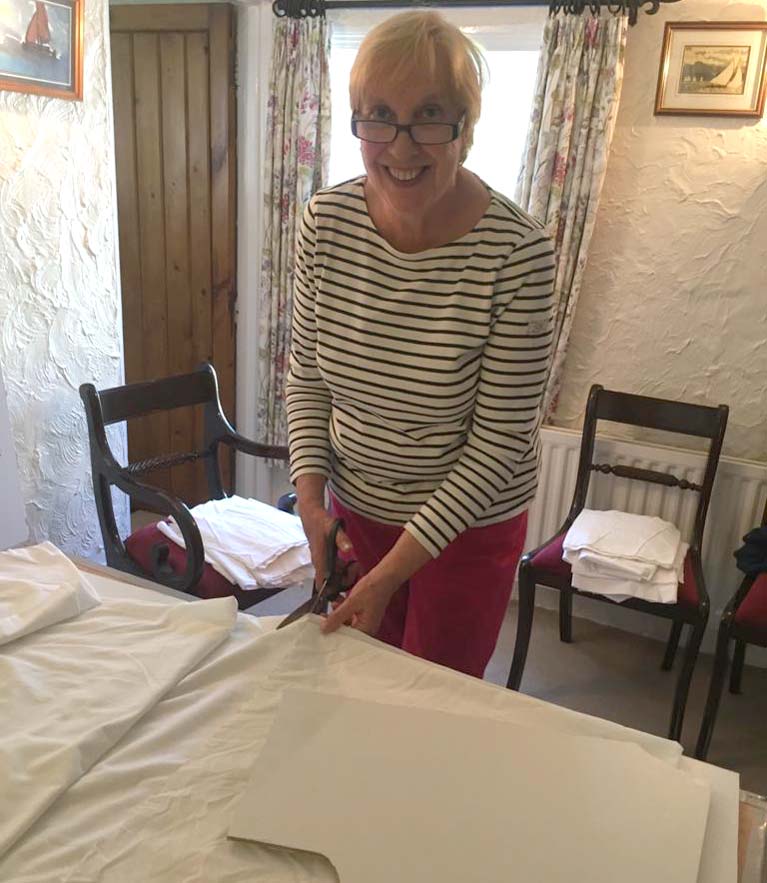 Paddy Mullan, Quoile Yacht Club member preparing the fabric for the scrubs
Paddy Mullan, Quoile Yacht Club member preparing the fabric for the scrubs
“This was all done with strict social distancing in mind, a large plastic box was left at the bottom of Jills drive into which donations were made. Very soon we had lots of donations and offers of help.
She continues: “I think it is a very worthy cause, it has not been easy to get materials such as fabric, thread and elastic but with the promotion of this group the community have come together by donating much-needed materials. Thanks to many kind donations including The Skip in Newtownards who donated fabric, thread and tape – we are truly thankful even adding our own little touch by dying the some of the donated fabric.”
Julie Chambers (KYC) and also a nurse adds: “What a week we have had, great fun, camaraderie, virtual sewing video chats and even getting to see a few faces on delivery –all with social distancing in place!
Everyone jumped on board and felt they were contributing to our NHS and even more so as some of us are still working and have a lot of young family members on the front line. We will certainly be out Thursday evening clapping.”
The group are sewing scrubs for the Ulster Hospital, COVID testing centres, the Maternity unit at the Ulster, the Mater and Ards and North Down community nursing.
Lisa McCaffrey (RYANI Active Clubs Coordinator) explains: “This is a great example of how our sailing community is working together and it’s fantastic to see all the volunteers putting their expertise and skills to help support our key workers.
If you would like to know more about this group follow them on Facebook – North Down & Ards scrubs for NHS.
300 Top Junior Sailors Bound for Dublin Bay
Over 300 sailors will compete in Dublin Bay in seven different classes (Laser Radial, Laser 4.7, 420, Feva, Topper, SL16 and Optimist). For youth sailors, this event is the most important in the annual calendar as it is the decider for the top Irish sailors to compete internationally during 2011 and is the pathway for future Olympic sailors. Podcast with Olympic Team Manager James O'Callaghan here.
The 420 fleet is already in situ as the Leinster Championships were held over Easter and the girls team Emma Geary and Niamh Connolly won the event in style. This team is the only 420 crew to qualify internationally for a place on the Irish team to compete in the ISAF Youth Worlds in Zadar, Croatia and will be looking to win next weekend to secure this honour.
Dublin Bay will host the 2012 ISAF Youth World Championships and this year's ISA Mitsubishi Youth National event is an important test event with representatives from the international sailing authority visiting Dun Laoghaire to view plans and test logistics.
In addition to the 420 fleet the Laser radial fleet will also be competing to qualify to represent Ireland in Croatia. Philip Doran aged 17 from Courtown in Wexford is the current former under 17 World Champion in the Laser Radial fleet although the National title has eluded him so far. In the girls fleet it will be a toss up between Saskia Tidey (RIYC) and Sophie Murphy (Quoile YC) as both already have a national title each under their belts.
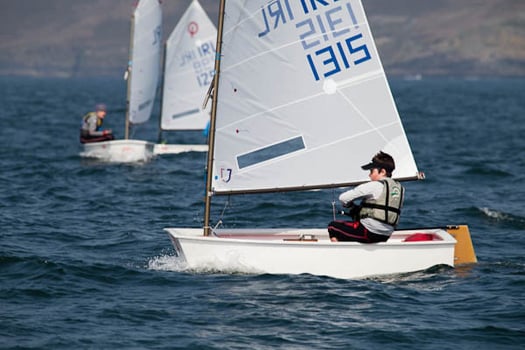
A fleet of top Optimists are expected. Photo: Bob Bateman
The younger Optimist fleet is also celebrating this week after two top 5 positions at the Easter Regatta in Braassemermeer, the Netherlands. In fact an Irish team has competed at this event for 23 years and this is the first time that Ireland has won the country prize. Sean Donnelly from Dun Laoghaire who finished fourth in Braassemermeer is also leading the Optimist fleet in the trials and will be anxious to hold on to first position during the ISA Mitsubishi Youth Nationals.
In other fleets, the laser 4.7 fleet is enjoying record numbers with many ex-Optimist and Topper sailors choosing this boat. Finn Lynch from Blessington and Seafra Guilfoyle from Cork will be firm favourites to win the class.
Overall Dublin Bay will be a spectacle of sail over the May Bank holiday weekend with light winds forecast.
Mitsubishi Motors have been a proud supporter of junior sailing in Ireland for the last 7 years. In recent years Ireland has had successes at youth level with winner of the girls under 21 Laser World Championships and a top 10 at the 2010 ISAF Youth Worlds and wins at the British National Optimist Championships.



























